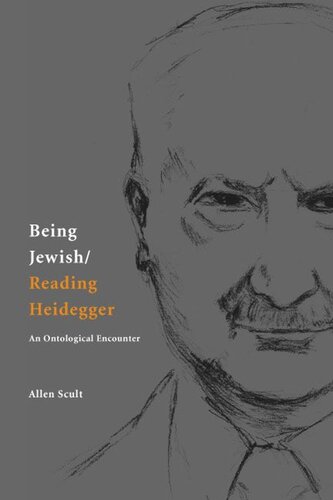

Most ebook files are in PDF format, so you can easily read them using various software such as Foxit Reader or directly on the Google Chrome browser.
Some ebook files are released by publishers in other formats such as .awz, .mobi, .epub, .fb2, etc. You may need to install specific software to read these formats on mobile/PC, such as Calibre.
Please read the tutorial at this link: https://ebookbell.com/faq
We offer FREE conversion to the popular formats you request; however, this may take some time. Therefore, right after payment, please email us, and we will try to provide the service as quickly as possible.
For some exceptional file formats or broken links (if any), please refrain from opening any disputes. Instead, email us first, and we will try to assist within a maximum of 6 hours.
EbookBell Team

5.0
18 reviewsThis innovative book investigates "being Jewish” not as a sectarian religiosity but as a way of being-in-the-world particularly suited to understanding Heidegger's early phenomenology. At its core is an intimate engagement with “sacred texts,” which grounds “being Jewish” in a way of life constituted as a way of reading—a way of reading transmitted to succeeding generations as a passionate teaching. Allen Scult argues that Heidegger was similarly involved in a passionate attempt to introduce his students to philosophical practice through a personal engagement with the words of Aristotle. Scult traces the hermeneutical affinity— even intimacy—between Judaism as a way of life, grounded in an intense interpretive relationship to the Torah; and Heidegger's view of philosophical practice, as a similarly intense interpretive relationship to the founding texts of Western philosophy. In tracing the dynamics of this relationship in Heideggerian and Jewish hermeneutics, Scult not only finds mutually enlightening points of contact between the two, but also uncovers new ways of understanding how Heidegger’s fundamental ontology is grounded in the lived experience of religion. Allen Scult is National Endowment for the Humanities Professor of Philosophy and Rhetoric at Drake University. He is co-author of Rhetoric and Biblical Interpretation. Being Jewish/Reading Heidegger ponders what it means to read Heidegger on his own terms, that is, to read him from the place where one is, in Heidegger’s language, in and from the facticity of one’s own Being... To be Jewish, according to Scult, is to be entexted with Torah. Scult argues that this notion of binding one’s being with a textual tradition underlies Heidegger’s theory of Dasein. He uses Heidegger’s lectures on Aristotle’s Rhetoric to illustrate how Heidegger ‘reads Aristotle’ and, in doing so. . . teach[es] the Jew how to be-Jewish-in-the-world through an engagement with a textual tradition (Torah). .Shaul Magid, The Jewish Theological Seminary of America “a compelling account of how being-Jewish enacts the sort of concrete, revealing relationship to a text and a world that makes meditation on being, as Heidegger - early and late - understands it, possible. Only someone with Allen Scult's trained ear for the subtle interplay of rhetoric and hermeneutics could make us see the remarkable parallels between the Rabbis' reading of the Torah and Heidegger's reading of Aristotle….he makes a trenchant case for ‘a reading of Heidegger not as prophet, but as Rabbinic sage’.”--Daniel O. Dahlstrom, Boston University